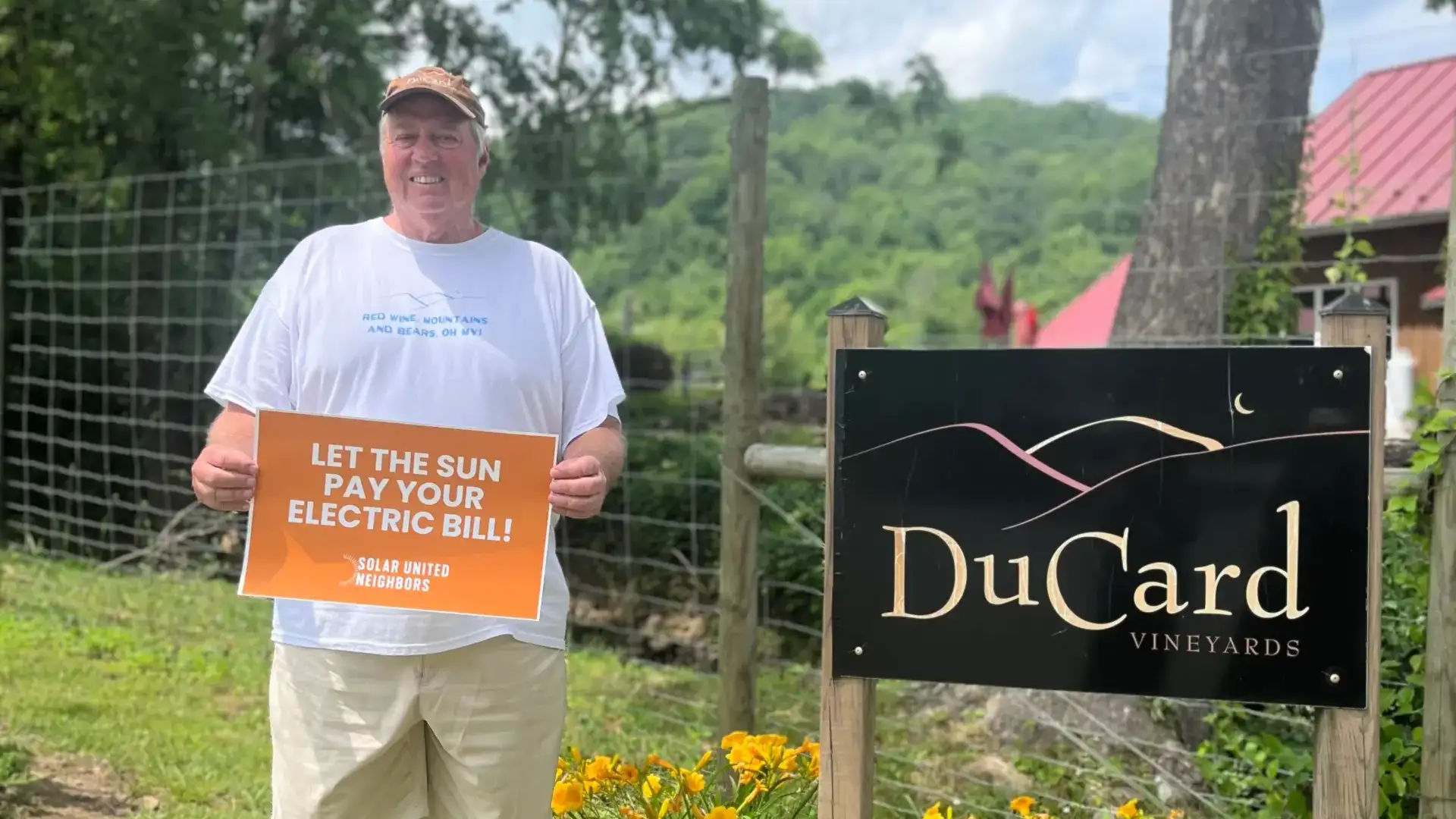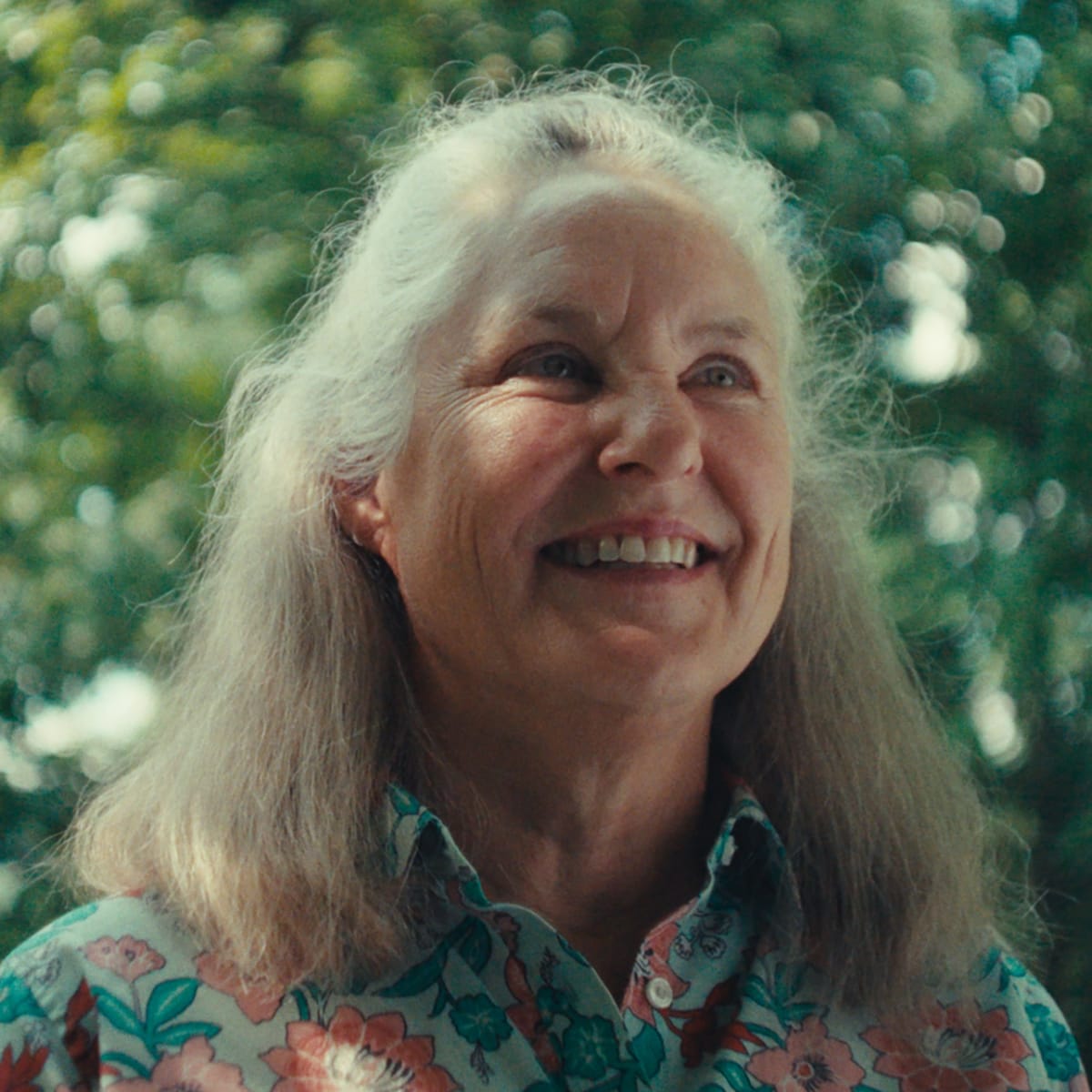DuCard Vineyards – Etlan, VA
- Rural Energy for America Program,
- Stories

We use the sun to ripen our grapes, so why don’t we use the sun to power our operation? It’s a perfect match that way
Scott – DuCard Vineyards
Could you share a bit about how DuCard began?
We just bought a cabin out here as a getaway from DC, and it had a dead old apple orchard that hadn’t been farmed in 50 years on the front. I was going to replant it with something, and somehow I stumbled upon the idea of replanting it with grapes. We sold off the grapes after they came in a number of years later to other wineries, and they made award-winning wines with our grapes, so I decided we would expand then into a tasting room and a winery ourselves with our own DuCard brand name. We opened that way 15 years ago.
We have a portfolio, so there’s reds and whites, there’s mostly dry, but a little bit of sweet. We have a beautiful dessert wine, a port, and we’ve got a couple of sparkling wines that are really fun for the summertime. So it’s kind of a full service thing. We don’t have a commercial kitchen here, so we don’t do food, but we do charcuterie boards with local cheeses and that type of thing just as a way to compliment it. So, people come out just as a getaway. It’s off the grid purposely and borders the Shenandoah National Park out the back door at the treeline. Its a getaway from the real world, basically.
Do you ever host events?
We have music every Saturday afternoon and Friday nights. We do wine education events, we do oyster festivals, murder mysteries, Elvis will be in the house this summer, all kinds of stuff. We like to make it fun and low-key. It’s very non-stuck-up.
What does it mean to you to own a local vineyard, and what do you think it means to the community?
We have a really incredible customer base, both locally and in Northern Virginia and Richmond and so forth. They come to it as a destination because they’re looking for a getaway. We really focus on high quality service, and people are very appreciative of that, and very complimentary. For all the time and effort and cost you put into it, it’s really nice to have a good customer base.
We’re pretty big in the community. We do a number of non-profit initiatives. We’ve got a couple of wines which proceeds partially benefit the Shenandoah National Park. A local community band had their 100th anniversary last year, so we did a special label for them as a fundraiser. I like to be involved with the community, and wine is my currency, so I try to use it for good purposes.
Also, the vineyard is kind of a community asset. It’s not easy to meet people out here. But, they get to see each other here, and regulars have their usual table and everything, which makes them feel comfortable here.
What is your favorite part of owning DuCard, and what are some challenges you encounter?
I think the diversity of the business is really great and challenging at the same time. The whole growing season is subject to weather and frost, and in the spring you deal with heat and humidity, and then in the summer you have hurricanes, and finally in the fall insect damage. In the end, though, when you finally get through all that and you make a wine that’s really good in your glass, you really enjoy it, and it gives you a sense of fulfillment when you see that everybody likes it.
There’s kind of three aspects to the vineyard. There’s farming, which is growing the grapes. Then there’s manufacturing, which is making the wine. Then you’ve got retail and customer service, or agro entertainment. So every day and every season it’s got something different going on. It’s challenging, but exciting and fun.
When and why did solar become an idea for DuCard?
I was a Boy Scout growing up. I guess my philosophy is pretty green. We need to be good stewards of the planet, generally, but especially when you’re farming. We use the sun to ripen our grapes, so why don’t we use the sun to power our operation? It’s a perfect match that way, and so I wanted to do that from the very beginning. I thought it was the right application for us.
Did you have any concerns about going solar?
Zero. What I didn’t know was whether there would be much maintenance on the system, but we’ve had zero maintenance.
What uses electricity on your vineyard that is powered by the panels?
I mentioned that there’s farming and there’s manufacturing and there’s retail or customer service. We don’t use solar for farming, but we use it for the manufacturing building where we’re running electrical equipment to process the grapes, and we use a lot of cooling to chill the grapes, basically as part of making the wine and storing it in barrels. Part of the solar energy goes to that, and the rest of it is just space cooling in our tasting room for people, and running the refrigerators and lights.
Have you been able to save money on your energy bills? How do those savings impact your business?
For sure. The solar makes you offset your electricity in the grid, so if the sun is out, your electricity from the grid is less or none. If it’s a really great day for solar and you’re not using electricity, your meter goes backwards. Basically, every minute you’re saving money when the sun is out. It makes us more sustainable. I look at this as an investment to be good for the planet and a good steward, but also to have a return that lowers your electricity bill.
What advice would you give to other rural business owners who are interested in going solar?
I think you should look into it and see if it has the payback for you. Especially if you’re a farmer and you are concerned about the climate and the planet, which I think rural people tend to be. For us, it’s had a payback. This first system has been in place for 15 years, so it’s long paid for. Every dollar I get as savings goes right to the bottom line. Then with REAP and the federal tax credit on top of it, you’re probably getting a payback even in seven or eight years, and frankly that’s as good as you’re getting on your agricultural equipment or any other part of your business. I think it stands on its own as an investment.
In your opinion, what is the importance of having grants like REAP to support rural businesses?
I think it’s really important because it changes the payback period so substantially. Most farmers and rural businesses are not high margin businesses for the most part, so any small change, even in the payback period, can change it from a no-go to a go. I think it’s very important to have the REAP grant in place, and the federal tax credit as well.
Since going solar, have you noticed others in the community going solar as well?
People ask us about it from time to time, and they comment on it a lot. We’ve made a range of other environmentally-focused initiatives as well. We have Tesla chargers in the parking lot, we’ve eliminated plastic water bottles, we even use low-weight wine bottles, which use less diesel over the road pulling the wine. People notice those things, and that we’re trying to do it the right way. I would do that anyway because that’s just who I am, but having sustainability in our quiver of characteristics as an operation is certainly desirable from a business standpoint.
Get the latest on solar straight to your inbox.
Fight for your solar rights.
Everyone has the right to go solar. Spread the sunshine nationwide and in your local community by taking action, joining events, and more.
